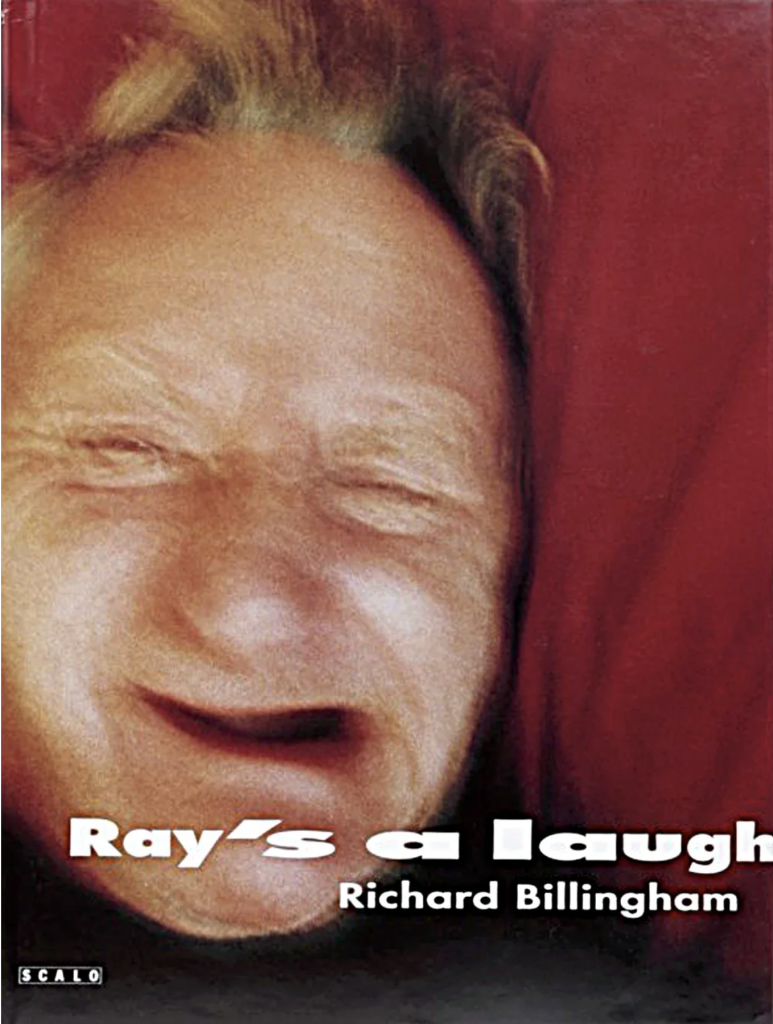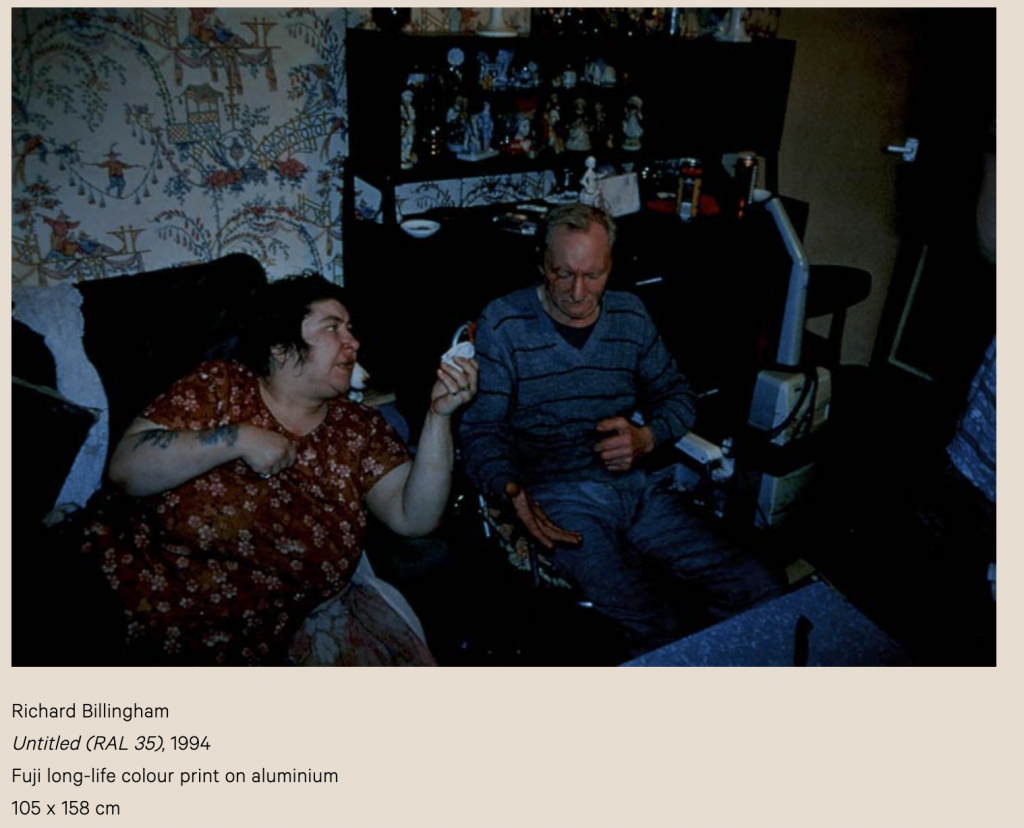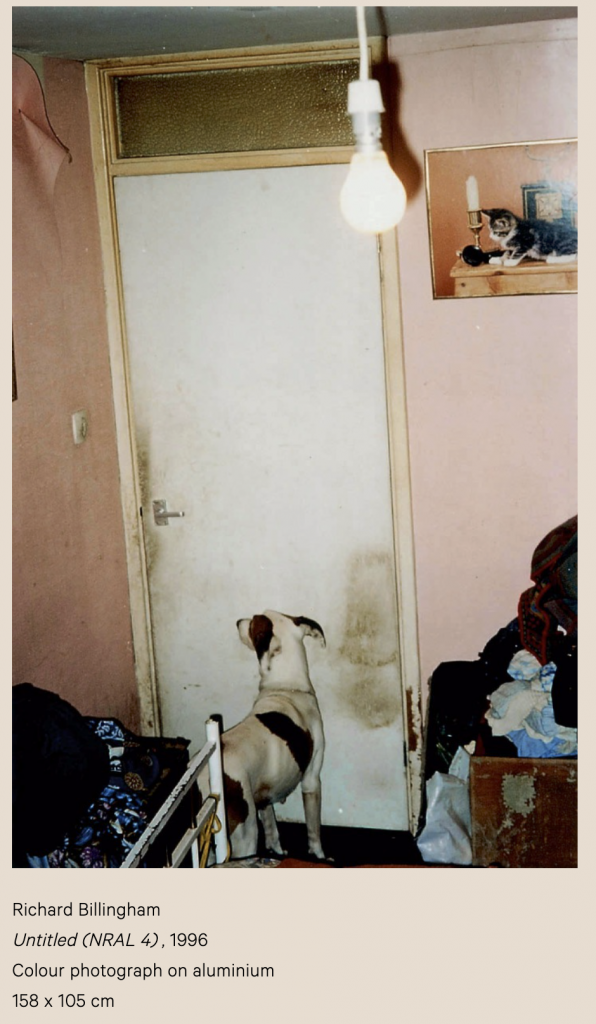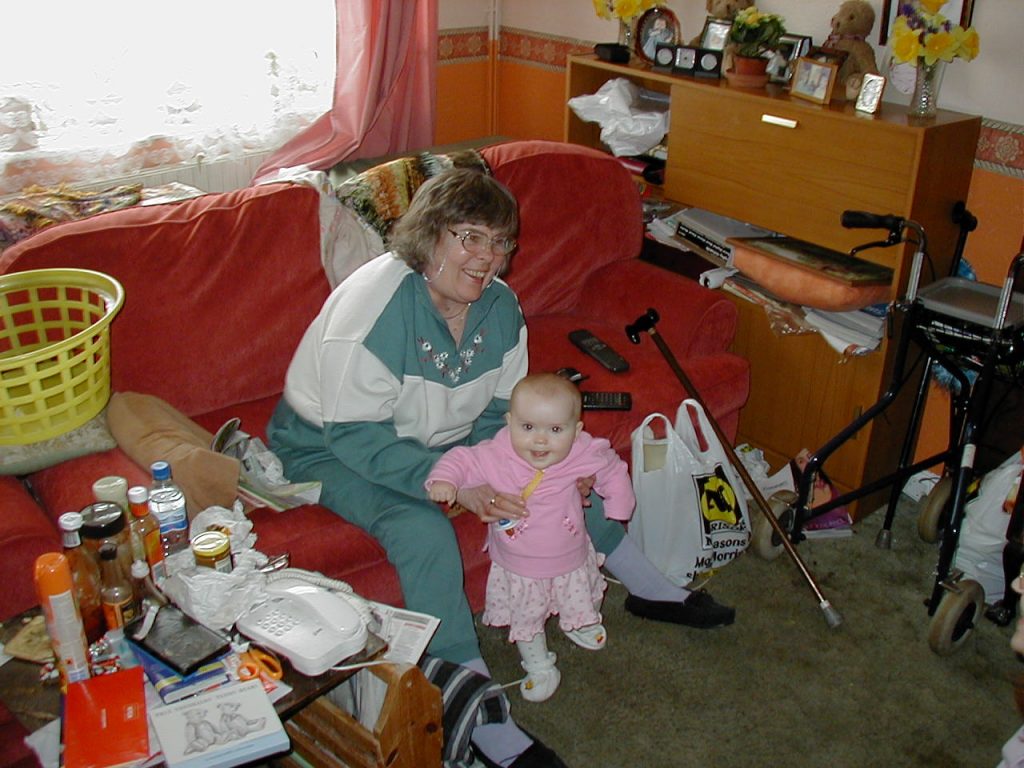We were given a task to look at works by four authors/photographers and choose one to discuss regarding the ethics involved in the photos included in the volume..
After looking into the photo journalism work of Kevin Carter, Bruce gilden’s book Only God Can Judge Me and Case History by Boris Michailov I chose the option to discuss Richard Billingham’s book, Ray’s A Laugh

No Laughing Matter
Up until today I had not heard of this book from Billingham. Documenting a few years in the life of his family and most visibly that of his father who was addicted to alcohol throughout. It strikes a deep chord with me due to my own experiences whilst growing up. My father is alcohol dependent and has been for as long as I can remember, although I didn’t realise this until much later and much of this book resonates with me.
Billingham’s family was based in Cradley Heath, West Midlands and he is only three years older than myself so it parallels with my own life somewhat, living in a working class family home in Shropshire..
Dependent and Dependants
Whilst some of the images Billingham captured may be hard to look at for some viewers, it’s amazing how he has captured his development in the family environment including the general detritus that exists around the home as well as images that capture his parents and their lifestyle. It’s bleak, for sure, but to many people this is reality that they live with everyday as part of the working class in the UK.
Certainly, there are people less well off than Billingham’s family and depictions of homeless people, and the poorest in society are regularly documented in an attempt to effect change. Ray, the photographers father, is an alcohol dependent, redundant machinist who lives with his wife Liz and their family including cats and dogs in a tower block. In the words of David Wise “Red wine up the wall. A broken toilet seat. Ray with his flies undone. Ray with a smashed nose, the logical end of another day’s drinking. Lost in alcoholic time, the days truncate. It could be yesterday or tomorrow. Same as it ever was” (Martin, J., Wise, D. and Mack, M. (1997))

Billingham made his images using colour photography, initially to use as a basis for his paintings that he’s working on at art school but soon realises, with the help of his tutors that this is an important body of work. Thus continuing with the documentation of this life that he has admitted to being ashamed of. This is a feeling I can understand, my home throughout my school years was untidy, under maintained and not a place that visitors wanted to come into often.
Ethically Speaking
In terms of ethical considerations for the taking, printing and publishing of the images it’s a complex issue. Billingham’s family obviously knew that he was using a camera to document their lives, an element of consent must have existed otherwise they would have prevented him from taking photographs in the house. Whilst there may have been some embarrassment for his family, and indeed even himself, it is an accurate portrayal and although his family may not have been overly happy upon it’s publishing as a collection.
Arpita Shah is quoted saying “I showed family members the series the as it developed and discussed my ideas on how they’d be potentially shown, but it is very complex when it’s a family member because they want to support you and they love you — so getting balance between sitter’s consent and family member support is really complex and something I’m still working on.” (Dodd, 2021)
This discussing consent with family when they want to support you too needs to be addressed in the conversation and a factual decision made as a consensus. If my family, or other people, ask me to not take their photo I don’t, it may be that I’ve already captured the “decisive moment” as Cartier-Bresson called it but if I ask permission every time I bring the camera up I would not get the desired image. With “Sharenting” being an issue in the early days of social media I was pretty careful to not over-share images of my kids who have no agency to give consent. I do take photographs of my parents, with their full consent, as I’m documenting their lives in a similar way to Billingham, although I’d not considered this before starting the degree course.
Power Dynamic
Billingham as the photographer has majority power but I would argue that he does not have ALL the power in the relationship. It might be considered that he has ultimate power over the people in the images upon the publishing of the work and that they have no voice to respond to the overall representation made by the selection of the images included in the book. Thinking conversely, publishing images of his family in this way does give them some power and agency that will stay in the conscience of anyone who has studied the work. It allows Ray to live on as a constant reminder that life isn’t always rosy and social changes are required to prevent people from experiencing lifestyles that see them becoming victims of advertising campaigns and consumers of addictive substances. Billingham states on the Saatchi Gallery website, “My parents and brother are very happy with the book. Neither I nor they ore shocked by its directness because we’re all well-enough acquainted with having to live with poverty. After all, there are millions of other people in Britain living similarly…””

One of the overwhelming reactions I have to this work is that of Love, love for his family and the process of growing up with them. Even though Billingham states in the Guardian article “I just hated growing up in that tower block.”, (Adams,2016) I still feel he has affection for the people in the images which might be difficult to understand when considering the circumstances, but they are his family and with all the faults and issues they are still his blood. The capturing of the backgrounds in the images is similar to some of my own photos and is a reminder to me of how I can improve my life along with that of my family. During my teenage years I did not notice the stains on the carpet, the dirty parts of doors and door frames where my family were moving past it. It strikes me in photos taken from this time and I can often be found cleaning parts of my family’s home that I foresee showing up in photos in the future.

Parallels
Underneath are two photos that spring to mind when I viewed Billingham’s work and are from my own catalogue. Each shows the piling up of rubbish that should have been in the bin days before as well as an unpleasant looking carpet. Each of my photos here are taken with consent but I haven’t expressly asked for permission to publish on this journal/blog but if I were to ever include in a publication then I’d make sure that I had the understanding of the family before going ahead with releasing it.


References:
Adams, T. (2016) ‘Richard Billingham: ‘I just hated growing up in that tower block’’, The Guardian, 13 March, Art & Design, Available at: https://www.theguardian.com/artanddesign/2016/mar/13/richard-billingham-tower-block-white-dee-rays-a-laugh-liz (Accessed: 26th February 2023)
Billingham, R (2010) Ray’s A Laugh [Online exhibition]. Saatchi Gallery. Available at: https://www.saatchigallery.com/artist/richard_billingham (Accessed: 26th February 2023).
Dodd, S. (2021) ‘The Ethics Of Documenting Your Own Family’, Witness, Available at: https://witness.worldpressphoto.org/the-ethics-of-documenting-your-own-family-7225ca8bd59a (Accessed:26th February 2023)
Griffiths,Bob (c.1990) My Brother Mike and Odie in the Living Room [Photograph]
Griffiths,Bob (2001) My mum and my daughter [Photograph]
Martin, J., Wise, D. and Mack, M. (1997) ‘Photography’, Art Book, 4(2), p. 35. doi:10.1111/1467-8357.t01-1-00027.
Parr, M. (2017) Ray’s A Laugh Final Book Dummy. Available at: https://www.martinparrfoundation.org/bookdummies/richard-billingham-rays-a-laugh/ (Accessed: 26th February 2023).
Comments are closed.